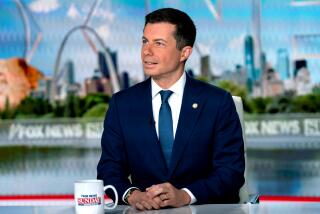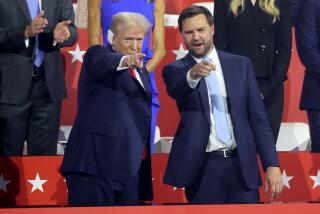Pete Buttigieg outlasts the pundits by emerging as the alternative to Biden

South Bend, Ind., Mayor Pete Buttigieg is fast threatening former Vice President Joe Biden’s dominance of the Democratic primary’s pragmatic lane.
- Share via
LEBANON, N.H. — As other presidential candidates promise free healthcare, college debt relief and sweeping new taxes on the ultra-rich, Pete Buttigieg is drawing large crowds with a different angle.
“This will be a presidency where you can turn on the news, look at the White House and feel your blood pressure go down a little bit instead of up through the roof,” the South Bend, Ind., mayor told some 1,300 voters who came out to see him here Saturday.
For the record:
3:29 a.m. Nov. 11, 2019An earlier version of this article incorrectly quoted Buttigieg as referring to the “failures of the Obama era.” What he said was the “failures of the old normal.”
With many Democrats growing anxious that an uncompromising progressive at the top of the ticket could push swing states into President Trump’s hands, the bookish 37-year-old Navy veteran and former McKinsey consultant is packing venues in Iowa and New Hampshire by talking moderation and reconciliation.
Voter interest certainly hasn’t fizzled, as pundits once predicted would happen to the candidacy of a leader of a city roughly the size of Burbank. Instead, Buttigieg is fast threatening former Vice President Joe Biden’s dominance of the Democratic primary’s pragmatic lane.
“He makes me feel inspired again, like Obama,” said Jo-Ann Wangh, a 69-year-old arts integration specialist who came to see Buttigieg at a Manchester town hall. “He gets it.”
Buttigieg is already surging in Iowa, where a recent Quinnipiac poll showed the openly gay mayor just a point behind the Iowa front-runner, Massachusetts Sen. Elizabeth Warren. He has considerably more work to do in New Hampshire and beyond. But as he bounded into this state for a four-day swing of town halls, rallies and walking tours that drew large crowds, rivals were expressing agitation at his ascendancy.
“I was mayor of a city that’s 14 times larger than South Bend,” former Housing Secretary Julián Castro quipped last week on Comedy Central’s “The Daily Show.” “We could almost fit South Bend in our Alamodome in San Antonio.”
Castro took aim at Buttigieg’s biggest shortcoming: meager support from African Americans and other minorities. It is “risky to have a candidate at the top of the ticket that cannot speak to, in a convincing way, those different communities,” Castro said.
But as more pedigreed candidates such as Castro and California Sen. Kamala Harris struggle, laying off staff in New Hampshire and losing steam with donors, the Buttigieg campaign is flush and primed for battle. Voters turning out to Buttigieg events are intrigued by his post-partisan pitch and his argument that he is uniquely qualified to find common ground with the swing voters in the industrial Midwest who added crucial votes to Trump’s coalition.
He has eclipsed in popularity centrist senators and governors who entered the race much better positioned to challenge Biden for the large share of voters seeking a pragmatist.
“My proposals cost a fraction of what some of the others do,” he said in Manchester. “There is a better way.” He warns that the progressive plans of some of his rivals will only further polarize the nation and fuel gridlock in Washington. He often says the ideas may be great in theory but their impact is “multiplied by zero” if they can’t get through Congress.
Instead of “Medicare for all,” Buttigieg proposes “Medicare for all who want it.” Instead of free college for all, he proposes free college for those who can’t afford it. Instead of soaking the rich with trillions of dollars in new taxes, he says they have to pay more — but not radically more.
“The one thing we have learned about the American experience is, we don’t have to do a wholesale transfer of wealth in order to have more equality,” he told reporters traveling on his campaign bus, taking questions until journalists exhausted what was in their notebooks. Topics strayed from his dissection of marginal tax rates over history, to his experience coming out of the closet, to his favorite Episcopal hymn, which happens to be Welsh.
Such freewheeling media engagement separates Buttigieg from other top-tier candidates. It has been the backbone of his playbook since he entered the race an obscure long shot.
“Does anyone know where my Frida Kahlo socks got off to?” he asked staffers as the bus departed Manchester for an event at a drafty barn in the hills of Stratham. He then offered up to the traveling press the baguette given to him by a man on the selfie line after the Manchester town hall.
It had echoes of the “Straight Talk Express” bus, in which Sen. John McCain let loose with reporters mile after mile as he ran for the GOP nomination in 2000. But Buttigieg is a far more muted, cautious politician than McCain ever was. He presents like an affable professor, disciplined and reassuring to Democratic voters seeking respite from the anger and chaos of the Trump administration.
There are rarely surprises on the stump, and every word the candidate utters feels deliberate.
The mayor is on the upswing as Biden’s lethargic campaign performance and anemic fundraising have the party’s establishment in a panic, and moderate voters scoping out alternatives.
“We listened to Biden speak when he was here, and I felt like I was going to fall asleep halfway through it,” said Erin Sakolosky, a 33-year-old schoolteacher, interviewed as her newborn slept soundly in a Babybjorn carrier with a “Pete 2020” sticker affixed to it.
It was a common sentiment among New Hampshirites who showed up at Buttigieg events. Many were closer to Biden in age but were drawn to Buttigieg’s youthful energy and eloquence. “I am concerned Biden is not physically strong enough,” said Diane Ehrlich, a 61-year-old accountant from Amherst. “I don’t think he could beat Trump.”
Buttigieg isn’t alone in capitalizing on voter ambivalence over Biden. Michael R. Bloomberg, the centrist billionaire and former New York mayor who is positioning for a late jump into the race, threatens to build his own coalition of moderates.
On the bus, Buttigieg said he welcomed Bloomberg into the contest. Even with all his billions, Bloomberg may not be able to buy the kind of momentum Buttigieg already has. The New Yorker’s advisors have acknowledged he would be entering race too late to compete seriously in Iowa and New Hampshire, the traditional springboards to the nomination. The Bloomberg plan is to forgo those states to focus instead on larger ones that vote later. But that strategy failed for another former New York mayor, Rudolph W. Giuliani, when he ran for the GOP nomination in 2008.
Buttigieg chafes at comparisons to Biden and Bloomberg.
“My message is not about going back to where we were,” he said.
For a lot of people, “‘normal’ has been a real problem for a very long time, and I think the failures of the old normal help explain how we got Trump. I am running on building a future that is going to have a lot of differences.… One thing I learned in 2016 is to be very skeptical of any message that relies on the word ‘again.’ ”
More to Read
Get the L.A. Times Politics newsletter
Deeply reported insights into legislation, politics and policy from Sacramento, Washington and beyond. In your inbox twice per week.
You may occasionally receive promotional content from the Los Angeles Times.











